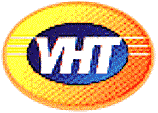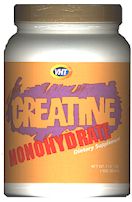

CREATINE MONOHYDRATE

- 100% pure white crystalline creatine monohydrate. VHT offers you five different sizes suited for just about everyone's needs and at the industry's best prices! VHT Creatine monohydrate offers you the purest quality.
- Creatine Monohydrate, or methyl guanidine acetic-acid, has been the focus of sport nutrition research over the past fifteen years. In healthy individuals, the body's creatine pool is approximately 120 grams, 95% of which is found in skeletal muscle. Chemically, phosphocreatine has been proposed as one of the most likely limitations to muscle performance during intense, fatiguing short lasting exercise.
- Studies have shown the ingestion of 20 grams of creatine for five days can lead to an average increase in muscle total creatine concentration of about 20%.1,2 Based on recently published studies, it appears that ingestion of 20 grams of creatine a day for five days will significantly increase exercise performance during repeated short lasting maximal exercise. The consistent finding from three recent studies is that creatine ingestion significantly increased exercise performance five to seven percent by sustaining force or work output during exercise.3,4,5,6
- The result of most current studies indicate that any improvement in exercise performance as a result of creatine supplementation is clearly associated with the extent of muscle creatine retention. These studies are a major breakthrough for Nature's Best and today's athletes. Creatine can now be considered a scientifically proven athletic supplement that should be used by athletes at every level.
- Greenhaff, P.L., K. Bodin, K. Soderlund and E. Hultman. The effect of oral supplementation on skeletal muscle phosphocreatine resynthesis. American Journal of Physiology 266: E725-E730, 1994.
- Harris, R.C., K. Soderlund, and E. Hultman. Elevation of creatine in resting and exercised muscle of normal subjects by creatine supplementation. Clinical Science 83: 367-374, 1992.
- Balsom, P.D., B. Ekblom, K. Soderlund, B. Sjodin, and E. Hultman. Creatine supplementation and dynamic high-intensity intermittent exercise. Scand. J. Med. Sci. Sports 3: 143-149, 1993.
- Birch R., D. Noble, P.L. Greenhaff. The influence of dietary creatine supplementation on performance during repeated bouts of maximal isokinetic cycling in man. Eur. J. Appl. Physiol. 69: 268-270, 1994.
- Greenhaff, P.L., A. Casey, A.H. Short, R.C. Harris, K. Soderlund, and E. Hultman. Influence of oral creatine supplementation on muscle torque during repeated bouts of maximal voluntary exercise in man. Clinical Science 84: 565-571, 1993.
- Harris, R.C., M. Viru, P.L. Greenhaff, and E. Hultman. The effect of oral creatine supplementation on running performance during maximal short term exercise in man. J. Physiol. 467: 74, 1993.
Note: These statements have not been evaluated by the Food and Drug Administration. This product is not intended to diagnose, treat, cure or prevent any disease.